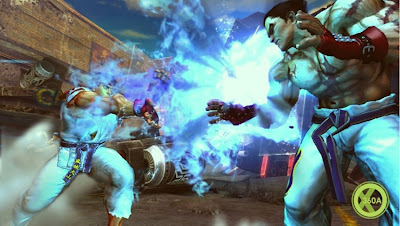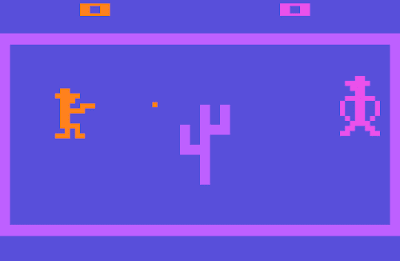 This is a terrible idea, the sort of thing that would excite people who write crossover fan-fiction, and the less said about that the better. Story is never a strong point in fighting games, but it does help if they're at least thematically consistent (which is why the unavoidable Star Wars characters in Soul Calibur IV greatly detracted from the game in my opinion). The games are also mechanically incompatible, 2D and 3D fighters are very different types of games, things like projectiles, anti-air, gauge specials are not common in 3D fighters, which have more of a focus on strings, evasion and the ground game.
This is a terrible idea, the sort of thing that would excite people who write crossover fan-fiction, and the less said about that the better. Story is never a strong point in fighting games, but it does help if they're at least thematically consistent (which is why the unavoidable Star Wars characters in Soul Calibur IV greatly detracted from the game in my opinion). The games are also mechanically incompatible, 2D and 3D fighters are very different types of games, things like projectiles, anti-air, gauge specials are not common in 3D fighters, which have more of a focus on strings, evasion and the ground game.I'd actually be quite interested in a 2D Tekken, as Namco have far better character design than Capcom (as iconic as it is, the Street Fighter cast is a bit rubbish - that's why there's such a problem with "shoto-spam", most people don''t want to play anyone but Ryu and Ken), and I do enjoy 2D fighters. I don't think I'd be that keen on a 3D Street Fighter, I have bad memories of the awful Street Fighter EX series. The cross-over, however, holds very little interest to me.
 What is really sad, though, is that the two companies with the most success in fighting games, are both releasing a cross-over when the fighting genre is so starved of new games. Just look at what's on the market: Tekken 6 (7th game in the series), Soul Calibur 4 (5th game in the series), Virtua Fighter 5, Street Fighter 4 (probably between the 7th and the 15th, depending on how you count the versions), King of Fighters 12, the new Mortal Kombat will be something like the 9th in the series. Those are some big numbers. Even a newcomer like BlazBlue is only there because Arc lost the license to their own Guilty Gear games, and the similarities between BlazBlue and Guilty Gear are very evident. I'm not saying that sequels are a bad thing, the fighting genre benefits from an incremental approach because it is more about mechanics than narrative, but a little new blood wouldn't hurt.
What is really sad, though, is that the two companies with the most success in fighting games, are both releasing a cross-over when the fighting genre is so starved of new games. Just look at what's on the market: Tekken 6 (7th game in the series), Soul Calibur 4 (5th game in the series), Virtua Fighter 5, Street Fighter 4 (probably between the 7th and the 15th, depending on how you count the versions), King of Fighters 12, the new Mortal Kombat will be something like the 9th in the series. Those are some big numbers. Even a newcomer like BlazBlue is only there because Arc lost the license to their own Guilty Gear games, and the similarities between BlazBlue and Guilty Gear are very evident. I'm not saying that sequels are a bad thing, the fighting genre benefits from an incremental approach because it is more about mechanics than narrative, but a little new blood wouldn't hurt.Could you imagine if after Halo: Reach and Gears of War 3 Bungie and Epic decided to get together to make Halo vs Gears of War (because those two games have about as much in common as Street Fighter and Tekken do)? Instead, they'll (belatedly) move onto some new IP, with both companies probably continuing to make shooters, but they won't be forced to look back on themselves like the fighting genre seems to have to.



